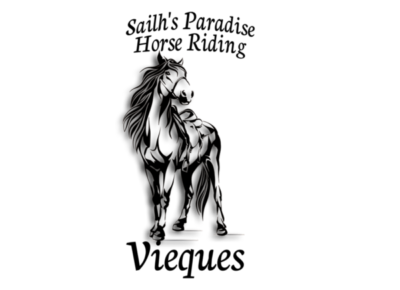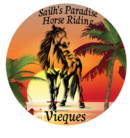
Bonding with my horse
This is what makes a horseback riding trip really special – the opportunity to interact with these beautiful and intelligent beasts while exploring the spectacular Vieques backcountry.
The funny quirks of the horses’ personalities bring laughter around the campfire at the end of the day; the quiet moments of understanding will leave you in awe at what remarkable creatures horses really are.
The Science Behind the Horse and Rider Connection
Researchers at Tromsø University in Norway have conducted a study into the bond between people and horses, interviewing a wide range of riders from Norway and the Midwestern USA.
They found several common themes throughout the interviews – one of the most intriguing concepts being the idea of “co-being.” Essentially, when horse and rider work together towards a common goal they become attuned to each other’s physical and mental needs and experience mutual benefits.
This goes along with the Mirror Theory that a horse is a reflection of its rider – but it explains the relationship in a much more complex way. A horse is not just a passive reflection of the rider, subject to the rider’s whims. Instead, the horse and human relationship can be quite egalitarian and the rider learns to adapt to and accommodate for his or her horse as much as the horse learns to obey commands. It’s a synergistic balance that can be nurtured and deepened with time.
A Horse Never Forgets
Nancy from Writing Horseback has experienced this powerful bond between horse and rider firsthand. She told me a story of a very special horse who remembered her, even after 15 years.
“When I sold my Quarter Horse, Pampa, as I was heading off to college, I had the arrogance to insist that the new owner would never sell this horse. Fast forward 15 years. I had posted a sign up at a local riding stable, “full-time mom looking for horse to ride once a week.”
I asked the barn manager if I could post the sign and she recognized me as selling her Pampa 15 years prior. She asked if I wanted to see my horse and as I rounded the corner, with tears in my eyes, he nickered to me. To my surprise and delight, he remembered me!”
There are countless other heartwarming stories of horses remembering their riders, even after many years. Scientists believe that horses are able to distinguish humans by their voices.
Researchers at the University of Sussex performed a study where they broadcast the voices of horse’s owners over loudspeakers, with both the owner and a stranger standing near the horse. When the horse heard the voice of the owner over the loudspeaker, it would turn to the owner rather than the stranger.
Recognizing voices in this way was previously thought to only be a human trait.
The Art of Non-Verbal Human-Horse Communication
Horses don’t speak our language, but we can still communicate with them in a lot of effective ways. Nancy also told me about a connection she forged with Magnum, a Tennessee Walking Horse she rode in Montana. They were able to understand each other, even though no words were spoken.
“He knew to stand still during the mounting process and I knew to relax deep into the saddle to signal to my horse that I was ready to go,” explains Nancy. “In short, we were both speaking one another’s language without any verbal communication. The language of love on horseback is conveyed through touch and feel.”
Horses are quite intelligent creatures and they can pick up on a lot of the non-verbal cues that humans give, allowing them to understand your mood and emotions. Your horse knows when you are nervous and when you are calm. He knows when you are feeling sad or when you are happy or confident. And of course… he always knows when you have carrots.
Trust and Patience
Joe from the Soul of a Horse blog writes about this powerful bond and the gentle kindness that is necessary when communicating with horses. In his story “Trust – It Changes Everything” he writes about training his horse Ezekiel. After many attempts to teach Ezekiel the command “back up” he describes the lightbulb moment when the horse finally understood.
It was “such a delight to watch his eyes and face and ears as the realization begins to sink in that this is a totally new experience, unlike any he’s had before; as he lets his fear dissipate and trust creep into his being.”
The love and patience that Joe has for horses comes across strongly in his writing. “I love this horse,” he explains, “and I want him to trust that I will do nothing, ever, to violate that trust.”
It is important to remember this. Unlike a bicycle or an ATV, your four-legged transport is a living and breathing creature with a mind and soul of its own. It learns and remembers. When you get out of the saddle at the end of the day the journey will have changed you both. As a rider, it is your responsibility to make sure that change is a positive one.

